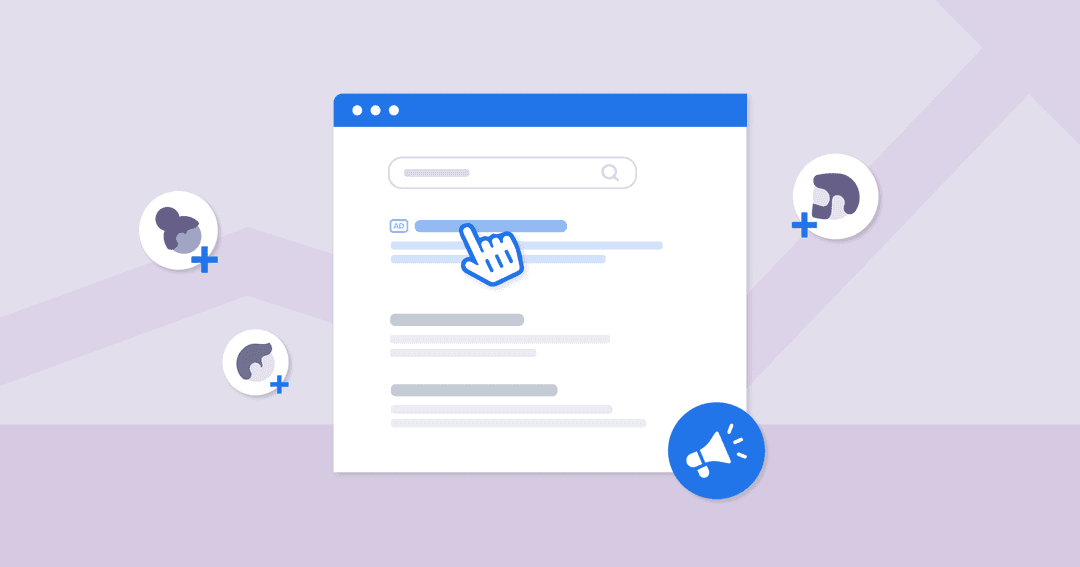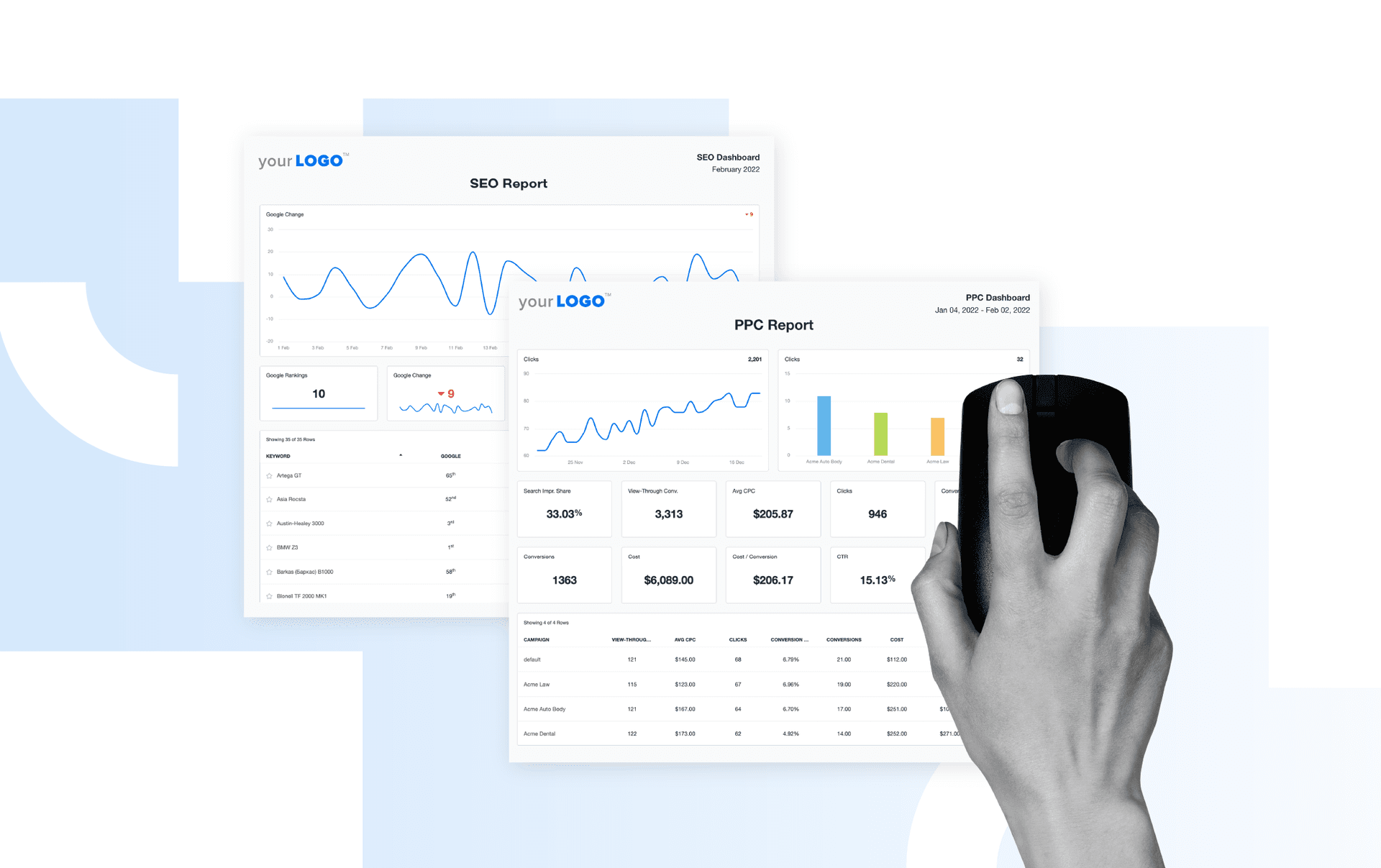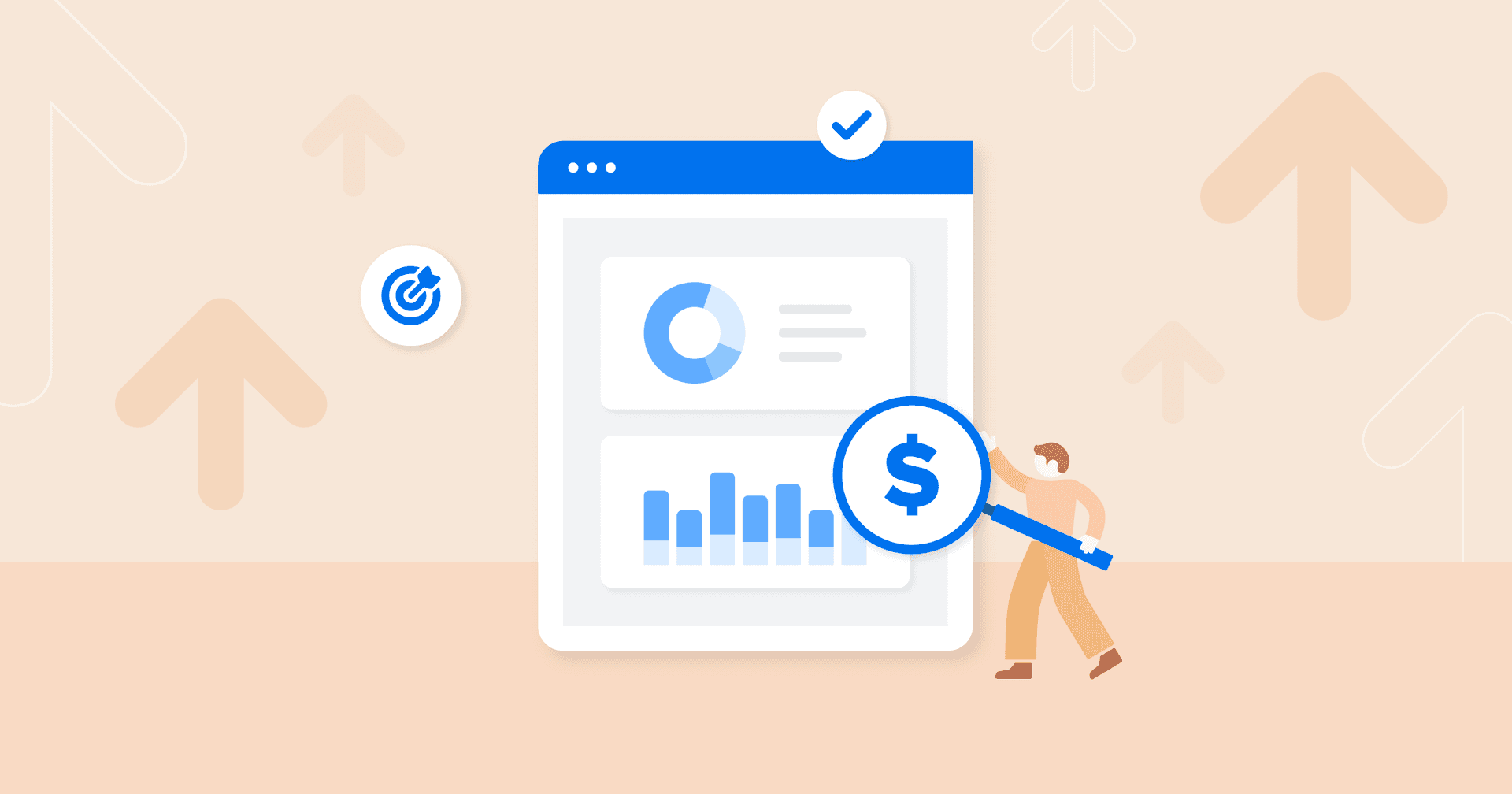Table of Contents
QUICK SUMMARY:
Learn new strategies for acquiring more PPC client and understand the importance of distinctive branding and advanced analytics to drive client growth and revenue. This guide covers methods to differentiate services from competitors, including innovative pricing and targeted advertising approaches. The piece is a valuable resource for agencies seeking to enhance their PPC client base and maximize returns on ad spend. Bookmark it for future reference!
According to figures published by Statista, the global digital advertising industry is projected to hit $679.8 billion in 2023. And why not? PPC ads are an effective channel for driving engagement and bringing new products to market, and platforms like Google Ads estimate that their customers record an 800% ROI on average.
But, as the industry continues to grow rapidly, competition is heating up, and it’s getting harder to get PPC clients and retain those clients by justifying your pricing with measurable ROI PPC figures.
How To Position Your PPC Agency and Stand Out
As the paid ads industry continues to grow, there’s equally no shortage of freelancers, consultants, and agencies who can match your services—often for a cheaper price. So, why should potential clients hire your agency?
If you try to get more clients and compete purely based on pricing, there’s always going to be a competitor to undercut you; instead, you can use a combination of targeted branding, cold outreach, cross-promotion with other agencies, and your own paid ads program to stand out to your ideal clients.
1. Define Your Ideal Client
Instead of trying to promote your services to every company that has enough money to pay you, you can niche down, brand your service offerings around your ideal client’s needs, and increase your chances of turning leads into paying customers.
For instance, if you define your target clients as just startups, it’s going to be hard to differentiate your agency from the competition or make a strong argument for why a startup should choose you to guide their paid acquisition program instead of just bringing a PPC manager in-house.
Secondly, startups are—for want of a better word— ubiquitous, and according to Statista, there are over 328 million small businesses worldwide that’d qualify as startups if we used size as a yardstick. Among those, you’d have to pick clients from industries as diverse as fintech to life sciences.
How do you even market your services, create social proof, or scale up your agency with such a vague target audience?
A better approach would be to target post-Series B, American B2B SaaS startups that have raised at least $50 million and have an in-house Director of Marketing (for example). Those filters will significantly reduce the pool of startups to market to, but will increase the chances that you’ll make a good impression.
Examples:
Post Series B—Startups raise somewhere between $7 - $10 million at the Series B stage. That’s where they start ramping up non-product functions like marketing, growth, and user acquisition since they’ve probably figured out their product-market fit and are ready for growth.
At least $50 million raised—Nutshell estimates that small and mid-sized companies spend roughly $15k - $20k per month on PPC; depending on your pricing, you’d want potential clients that have enough cash to retain your services long-term.
B2B SaaS—Targeting a specific niche makes it easy for you to build a reputation and accumulate social proof that speaks instantly to the right clients.
An in-house Director of Marketing on staff—If a startup is still so young that they don’t have a marketing team, no matter how scrappy, chances are that they aren’t at the stage where they’ll benefit from external agencies. Secondly, having a growth-dedicated point of contact inside a client organization makes it easier to share reports, updates, etc., vs. if you have to go through the CEO for everything you need.
Of course, that’s just an example. Your target could be based on a specific industry, a geographic location, or the client’s target audience.
Whichever route you choose, creating an ideal client persona helps you refine your customer acquisition process, narrow down your offerings to become hyper-specific, and maximize your agency’s marketing budget (i.e., assuming you also use PPC to get your clients).
2. Evaluate Your Target Client’s Current Marketing Efforts
One effective strategy for getting more PPC clients at an agency is to use a target client's current marketing efforts to identify who might be a good fit for your PPC services. By analyzing their existing marketing strategies, you identify areas where they may be lacking or struggling and provide a solution with your PPC services.
Here are some steps to follow when using a potential client's current marketing efforts to identify a good PPC client:
Evaluate their current marketing channels: If a client that matches your ideal profile is promoting their business using other marketing channels, such as social media, email marketing, content marketing, and SEO, but does not have any PPC campaigns running, that is a gap where they could benefit from your agency’s support.
Check their paid advertising efforts: Look for any existing paid advertising efforts that they are currently running. This could include Google Ads, social media ads, or display ads. Evaluate their ad copy, targeting, and overall Google Ads optimization effectiveness to determine if there is room for improvement.
Assess their budget: Determine if the potential client has a budget for paid advertising and if it aligns with your agency's services. You don't want to waste your time on a potential client who can't afford your services. Or, if the budget is too low, ask to increase their PPC budget.
Look for competitors: Identify who their competitors are and evaluate their current advertising strategies. Determine if there is an opportunity to outperform the competition with more effective PPC campaigns.
3. Clearly Outline Your Agency’s Offering
Positioning your PPC agency requires that you build a persona that defines the platforms you work with and the type of customers you assist and uses that information to make an argument for why potential customers should hire you.
Essentially, you need to create a brand image that convinces potential clients that you offer:
Platform Experience—Do you run ads on Facebook, Google, Reddit, Twitter, LinkedIn, Yelp, Microsoft Ads, or Instagram Ads? Do you have case studies and testimonials to back up your experience?
Preferred Channels/Specialty—What do you specialize in? Display, search, shopping, video, or eCommerce ads?
Existing partnerships with ad platforms, such as Google’s Partner program or Facebook’s Marketing Partner certification.
A data-first approach to analyzing keywords, assessing competitors, studying existing campaigns, planning new ones by studying historical data, and reporting your campaign metrics
Relevant industry experience—Do you have sufficient experience (backed by case studies and testimonials) in your ideal client’s niche?
A clear PPC pricing structure with no hidden fees or complicated billing tricks
It’s also worth calling out if the agency specializes exclusively in PPC services or if PPC is part of the larger digital marketing picture the agency can paint alongside social media, SEO, programmatic advertising, and more.
PPC Pricing Models and Packages
Your PPC pricing structure is another factor that’ll determine the caliber and volume of clients you acquire and retain. So, how much should you charge for PPC management?
There are several pricing models you can opt for, such as:
Flat fee— A flat fee, usually billed weekly, monthly, or quarterly
An hourly rate— Use a time tracking software to track and bill for hours spent creating and optimizing campaigns
A percentage of your customers’ ad spend (which can be automatically added to your client reporting using the PPC Markup feature).
Performance-based pricing—where customers pay you an agreed premium if your services manage to drive a certain amount of conversions, and
A hybrid model—you can either bill customers on a case-by-case basis or combine two or more pricing models.
Whether you’re working with SMBs or enterprise software companies, managing >$10 million in ad spend annually, we’ve written an extensive guide to pricing your PPC management services that’ll help you attract best-fit clients and keep your margins healthy.
How To Find PPC Clients
Like every other industry, your customer acquisition strategy needs a combination of inbound and outbound tactics to help you engage prospects, build warm connections, and increase your agency’s visibility. After all, your agency needs to stay top-of-mind when your ideal clients decide to invest in PPC services.
Here are 12 ways to find PPC clients for your agency.
1. Cold Outreach
Cold outreach often gets a bad rap, and whether it’s on LinkedIn or Twitter, decision-makers often rail about the bad cold emails and tireless calls they get from SDRs. Secondly, open (and reply) rates for cold emails tend to be dismal and can be as low as 1%.
But that doesn’t mean it’s not a viable channel for growing your PPC—in fact, email engagement metrics show a return of $42 for every $1 you spend. The trick is to find a niche for your agency, personalize your emails, and get to the point.
Niche down—Target a specific decision-maker role and customize your email sequence for them
Follow up with prospects anywhere between 4 - 5 times before
Personalize—According to data released by Woodpecker, the average response rate for a personalized cold email gets as high as 17%, but drops to 7% if you send a one-size-fits-all email blast
Make it brief—Try to keep your emails under 150 words if you can
2. Cold calls
A study by the Kenan-Flagler Business School estimates that cold calling has a dismal 2.5% close rate. But, even at that figure, you can still leverage cold calling to work for you if you:
Sell high-ticket packages that compensate for the time and energy spent acquiring clients
Use a script, and
Research your ideal clients before calling
3. Social
Facebook, LinkedIn, and Twitter have 1.929 billion, 134.5 million, and 259.4 million daily active users, respectively, and no matter your target audience, it’s a given that they’re going to be represented on these social media platforms.
But, instead of posting sporadically on everything from TikTok to Clubhouse, focus on 1 - 3 platforms and build a community where you can:
Build an employee-driven social media footprint
Use paid ads to build traction for your company pages
Leverage social listening tools like Mention to track any mentions of your brand
Engage with your ideal prospects in conversations that are related or adjacent to your niche
4. Work With Other Agencies
You can cross-promote your PPC offerings with other agencies whose services are tangential to yours.
For instance, you might partner with an SEO agency or a content studio to refer any PPC clients your way. At the same time, you send any customers that need content marketing or organic search optimization services to them.
Read more: Building Strategic Partnerships To Grow Your Marketing Agency
5. Get Certifications
Getting certified by your preferred ad platform is a surefire way to boost your agency’s reputation, inspire trust, and convince potential clients that your PPC services are worth the premium you charge.
Speaking of platform specification, different ad platforms offer their own flavor, including:
6. Run Ads Yourself
If you’re trying to advertise your PPC services, there’s no stronger hook than convincing potential clients that if your campaign could attract them, you’d do wonders for their business or product.
Target platforms where your ideal clients already spend time. For instance, if you work mostly with startups, targeted campaigns on Product Hunt and IndieHackers might get you in front of more founders and startup operators than a Facebook campaign
Leverage opportunities in the communities, Slack channels, and private groups you belong to where you can promote your services without sounding salesy, and
Experiment with different channels and focus on whichever offers the most ROI
7. Bundle Your Offerings and Other Enticing Offers
Clients who’re at the stage where they’re ready to invest in paid acquisition are also more likely to consider adjacent channels like SEO, social media management, and email marketing. If you can help them take their first few steps into a new marketing channel, most clients would be willing to experiment with you and even stay with you long-term if that specific channel turns a positive ROI.
Depending on your agency’s size, add specialists (or retain contractors) that will help you offer your clients tangential services bundled on top of your PPC management offering. That way, your clients can bring most (or all) of their paid acquisition—SEO, ads, social media management, etc.— under one umbrella.
Offer tangentially related services such as SEO, link-building, and content marketing
Create free strategy briefs to guide clients in scaling up their marketing and growth efforts
Offer downloadable guides, free PPC reporting templates, and introductory courses
8. Content and Partnerships
Developing specialized content that caters to your ideal clients is a powerful tactic for drawing in new clients for your agency. When you are able to address their fundamental needs, particularly in the realm of digital marketing and PPC advertising, it increases the chances that they will seek out your expertise for more advanced challenges.
In addition, this strategy helps to establish your agency as an authority in this area, which is a valuable position to own.
Expanding beyond your agency’s website, growth partnerships can take different forms, such as sponsoring industry-specific newsletters, podcasts, or communities.
Examples:
Minuttia, a B2B SaaS SEO, PPC, and content marketing agency, regularly sponsors Superpath, a content marketing community with >14k content marketers. In return, they get shoutouts in the Slack community, on Superpath’s website, and marketing collateral.
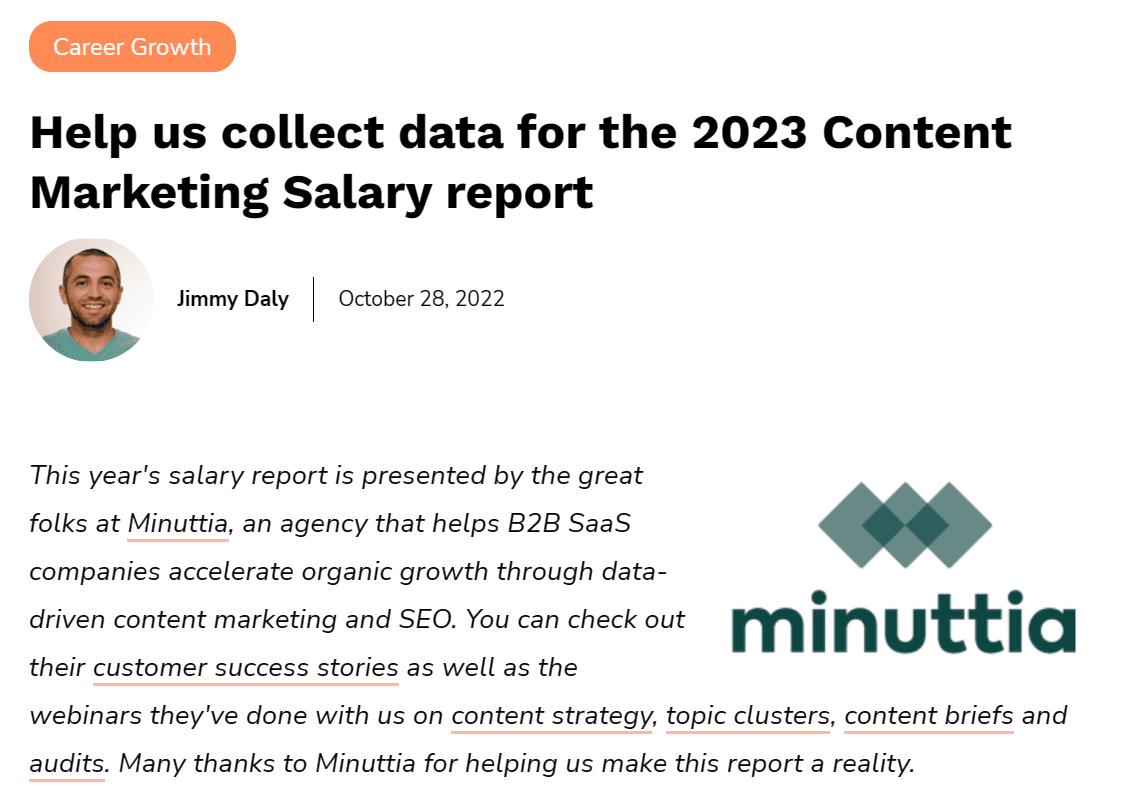
Superside (design-as-a-service) sponsors Demand Curve’s newsletters that reach 69,553 marketers, founders, and growth engineers every week.
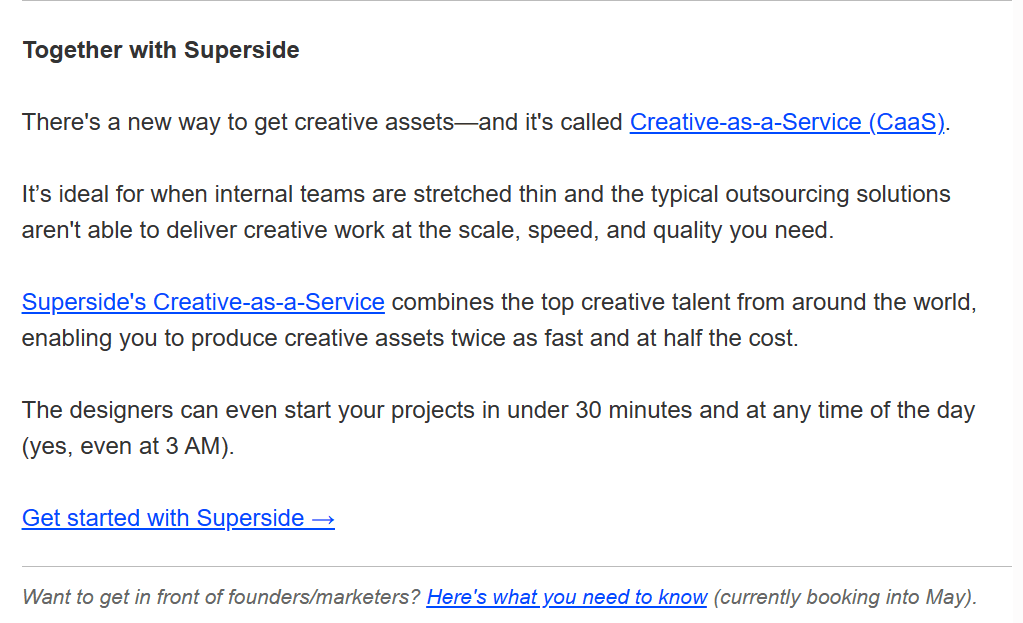
Pitch one to five industry-specific newsletters (i.e., in your ideal clients’ niche) for an opportunity to discuss how you’ve been helping their audience drive growth and acquire customers
There are plenty of other content opportunities that can help lift your agency off the page, including:
Regular training events and workshops
Strategic guest posting
Case studies and testimonials
Participating in digital marketing podcasts
The secret to building effective content and partnerships programs is to target communities and platforms where your ideal clients hang out, set specific goals, track your metrics to see if you’re driving a positive ROI, and be willing to experiment until a channel starts paying off or proves it's not a viable option.
9. Attend Networking Activities—Conferences and Workshops
Whether you’re attending a municipal Chamber of Commerce meetup, joining a roundtable discussion, sponsoring a conference, or visiting a live workshop, the aim of networking is simple: to acquire mindshare so that your potential clients think of you first when they eventually need PPC services.
Again, you need to be strategic with your approach to events marketing and target primarily the events where your ideal clients are going to show up:
Fintech: Payments by NACHA, UK Fintech Week, Money 20/20 Europe, FinTech Connect
Technology: TechCrunch Disrupt, ProductCon, Cisco Live, HubSpot’s INBOUND, Salesforce’s Dreamforce, etc.
SaaS: SaaStr, MicroConf, StartupGrind, Techspo, SXSW, Web Summit, Product-Led Summit
Legal: Legalweek, International Conference on Human Rights and Evolution of Law, Legal Operations Summit, Legal Geek North America, ABA Tech Show
SEO: Brighton SEO, Women in Tech SEO, DeepSEO Conference, SEO on the Beach, etc.
FMCG: Vitafoods Insights Europe, Packaging Innovations and Empack, The Nîmes Exhibition Fair, Fruit Logistica, International Food and Drink Event (IFE), Salon Du Chocolat, Genusswerk Fair, etc.
Local events, such as business workshops or accelerator programs
It’s okay if your events and networking leads don’t beat a path to your door after the first touch; that’s not the point. Your aim is to acquire mindshare, build connections you can reference in future campaigns, and reduce the friction prospects feel when you eventually reach out in the future.
10. Optimize Your Agency's Google Business Profile
To attract more clients for your agency's PPC services, it's essential to ensure that your Google My Business profile is current and tailored to your PPC and Google Ads offerings.
Doing so can increase your agency's visibility among potential clients who are searching for these services in your locality.
The best part is that you can use the Google Business Profile integration inside AgencyAnalytics to track your own agency’s performance.
11. Organize Regular PPC Hot Seats
Live case study sessions can be an effective way of attracting new clients to your agency. The idea is to invite local businesses to observe and actively participate in these sessions, where one business at a time will scrutinize their PPC campaigns in real-time.
During these sessions, offer customized advice and suggestions to businesses that are struggling with their PPC campaigns. This not only showcases your agency's proficiency but it also helps establish trust and reliability with other observers who could become potential clients.
12. Feature Your PPC Reporting Capabilities
Marketing agencies that are transparent in their dealings with clients tend to attract more business. When it comes to PPC reporting, highlighting examples of reports that you know clients will appreciate can be a potent strategy for acquiring new clients.
By demonstrating your agency's proficiency in delivering comprehensive and practical PPC reports, you can build trust and distinguish your agency from the competition. Offer that at scale by automating PPC reporting for consistent, branded updates.
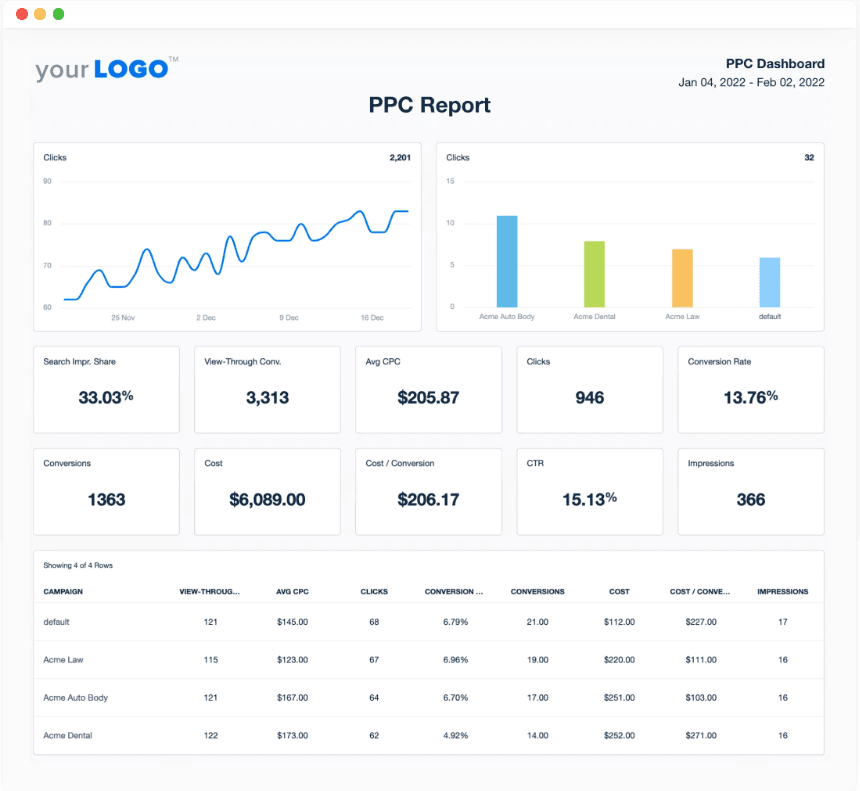
Create eye-catching PPC reports that showcase your agency’s ROI. Try AgencyAnalytics free for 14 days!
How to Track Your Client’s PPC Progress with AgencyAnalytics
Acquiring new PPC clients is just half the job done—very soon, you’ll have to get the ball rolling and start generating conversions and opportunities for your clients. More specifically, most clients will require a detailed breakdown of your metrics, including:
Top-of-funnel metrics such as impressions, CPL, reach, bounce rate, clicks or traffic, numbers of leads, etc.
Mid-funnel metrics, i.e., CTR on remarketing campaigns, form fills, signups, subscribers, etc.
Bottom-of-the-funnel metrics, i.e., total revenue, return on ad spend, conversion rate, cost per conversion (CPC), etc.
If you can’t draw a line from your PPC management services that leads to increased revenues and measurable growth for your clients, it’s going to get harder to make an argument for why they should keep paying you.
Read our article on what Google Ad metrics to track.
AgencyAnalytics helps PPC agencies streamline their reporting, prove their impact on revenues, and build compelling case studies with raw data. Using AgencyAnalytics, you can:
Generate reports and PPC dashboards rich with graphs, trends, and performance metrics in seconds using pre-built report templates, including a PPC report template, a Facebook Ads report template, and more.
Customize and white-label your reports for a brand-first look
Connect third-party data sources—Google Ads, Facebook Ads, LinkedIn Ads, and 80+ other marketing platforms—to pull all your live data into one source of truth
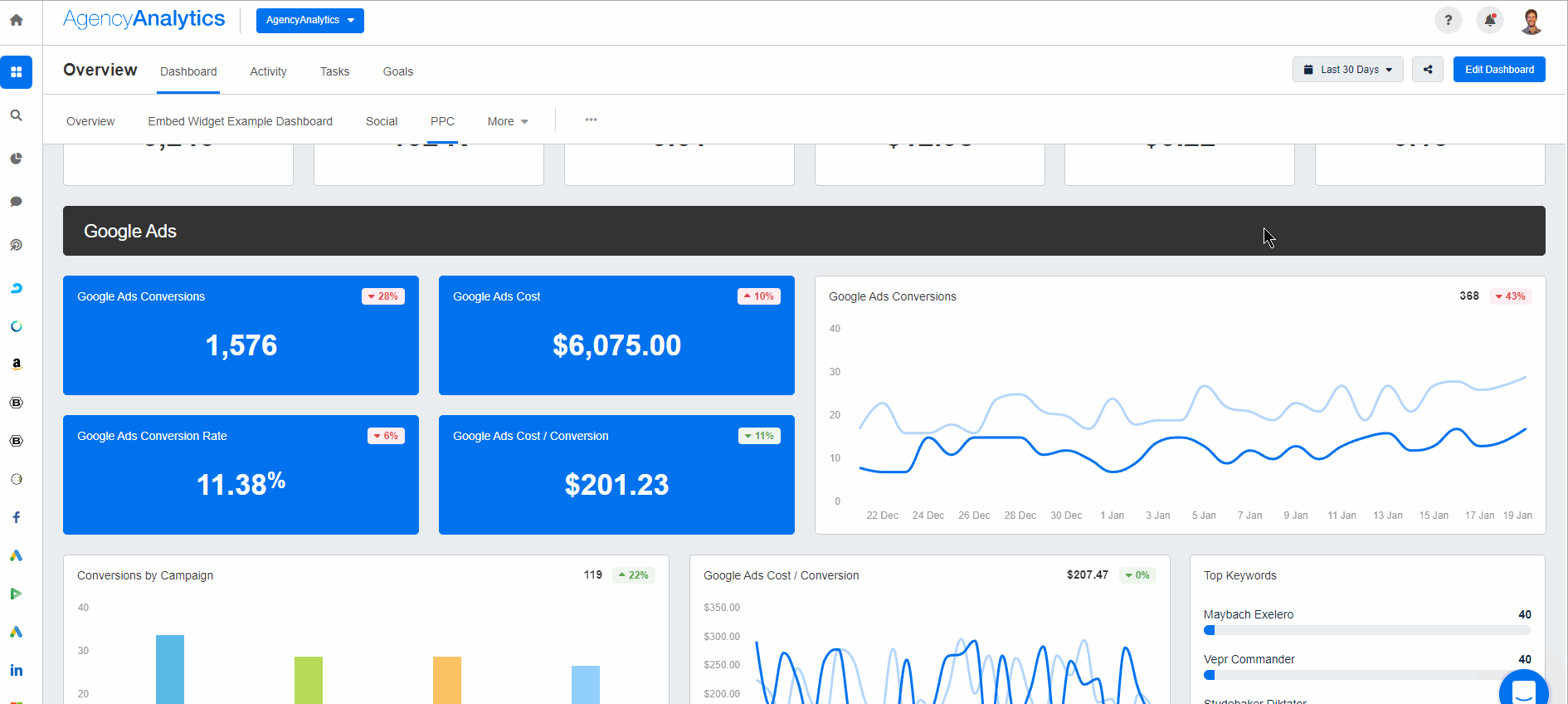
Create PPC reports that’ll keep your clients coming back for more. AgencyAnalytics empowers you with the most powerful tool for retaining clients after you’ve acquired them: clear data and provable ROI. Start your free 14-day trial today.

Written by
Churchill is an experienced product-led content marketer helping SaaS companies with their content needs.
Read more posts by Churchill LeonardSee how 7,000+ marketing agencies help clients win
Free 14-day trial. No credit card required.



